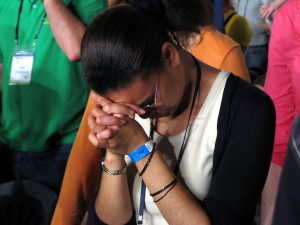Several years ago I was ambling about in John chapter 1, contemplating Nathanael and his encounter with Jesus.[1] Nathanael was the epitome of the Missourian, “Show me!” He wasn’t about to believe that a guy from the godless town of Nazareth was the Messiah and said so, but Jesus dissipated Nathanael’s skepticism in a moment. Just a few words and Nathanael was nearly falling on his knees in awe of Jesus, ready to follow him anywhere. Something supernatural occurred and it was not wasted on Nathanael. He knew exactly what happened and his life was forever changed.
Jesus’ words to Nathanael, “Before Philip called you, when you were under the fig tree, I saw you” held a powerful secret. I believe Jesus’ “I saw you” held a depth of meaning for Nathanael and the fact that Jesus saw him “under the fig tree” clinched it for him.

In a previous blog I likened the fig tree to Jacob’s rock pillow where in a night vision God appeared to him, standing at the top of a ladder which stood on the earth where Jacob was sleeping; the ladder reached up to heaven where God stood. God spoke to Jacob and conferred on him the promise He instituted with Abraham and passed on to Isaac, Jacob’s father. Jacob had the good sense to realize God had met with him there and called the place “The House of God,” Beth-el.[2]
A House Like No Other
This place, this Beth-el, held tremendous significance for Jacob and all his descendants. It was special in the heart and mind of Nathanael as well, who held the scriptures—the laws and promises of God—in high esteem. It is possible Nathanael sought out a private place where he could seek God’s face and listen for His voice and meet with Him. He may have found it under a certain fig tree, away from the eyes of all others; and in his mind he may have thought of it as his Beth-el, the House of God; his meeting place with God.
Perhaps it was because Nathanael knew there could only be One who knew about his fig tree/ house of God, that he was instantly convinced that Jesus was the Son of God when He revealed Nathanael’s secret, “…under the fig tree, I saw you.” Perhaps Nathanael had been fervently praying for the Messiah to come, and he knew in an instant Jesus was the answer to his prayer.
This is all conjecture on my part because the scriptures do not tell us the secrets of the fig tree. We are only told Jesus saw him there and Nathanael knew it was only possible by God’s power. But might not these thoughts come close?
Your House, Your Home
Do you have a place to which you resort to privately pour out your heart to the Lord? A place where you come aside to give vent to the yearnings of your soul? Where no one disturbs, for few know you go there? It is your private prayer closet. Your desert retreat. Your Beth-el.

Would you be surprised to realize that what you thought was your longing for God drawing you away to your place of prayer, was really God’s longing for you, calling you to Himself? It was an epiphany for me to realize—after many years of telling others how at a certain point in my life God “met” me after I had been crying out to Him for months—that it was in reality God crying out and calling to me for years, His tears manifest in my own.
And my life has not been the same since that night. This was the beginning of my personal journey with Christ as His disciple.
Coming Home
I believe that the reality of the yearning within us for God is actually God calling to us to “come away” to be with Him and to follow Him. It is there in our Beth-el, in the deeps of our hearts that He can reveal Himself to us and lead us in His paths of righteousness, for His Name’s sake. There is where He can begin to show us the “greater things” he has in store for us to do who believe in Him. There is where we gain more intimate knowledge of Him, for He opens our eyes to see He is the One the angels “ascend and descend” upon. He is the Way. He is the Truth. He is the Life.
Nathanael knew Jesus was his Messiah because he was already acquainted with his God. He knew his God and recognized Him in Jesus.
The fig tree, our Beth-el, our place of deepening intimacy with God, is crucial to increasing our knowing and understanding the heart of God, learning from His Word and following His Way. Then we too will recognize Him when He reveals Himself, and we will say with Nathanael, “You are my God and my King,” ready to follow Him wherever He goes.
[1] John 1:45-51
[2] Genesis 28:1-5, 10-22








